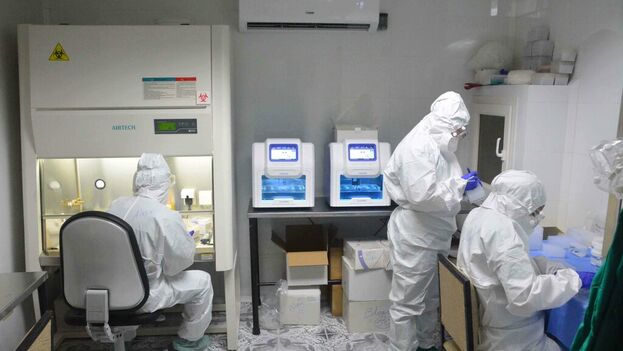
![]() 14ymedio, Havana, 17 October 2022 — Havana’s Salvador Allende Hospital, located in the Cerro district, will open its emergency room on Monday without the required staff. That means doctors will not be able to order lab tests due to an alarming shortage of workers. Sources at the hospital, also known as Quinta Covadonga, report that its young that lab technicians resigned en masse and without warning in order to “leave the country.”
14ymedio, Havana, 17 October 2022 — Havana’s Salvador Allende Hospital, located in the Cerro district, will open its emergency room on Monday without the required staff. That means doctors will not be able to order lab tests due to an alarming shortage of workers. Sources at the hospital, also known as Quinta Covadonga, report that its young that lab technicians resigned en masse and without warning in order to “leave the country.”
The island, which is currently in the midst of a dengue fever epidemic, has also long suffered from a serious shortage of medical testing supplies, which has prevented doctors from correctly diagnosing the disease. Now there are not even enough staff to perform the tests.
“In Cuba we can’t afford to get sick anymore. This is serious,” confesses the same source, noting how pointless it is to ask for reinforcements because “every Havana hospital has a staff shortage.”
The news comes on the same day as the opening of the Medical Tourism and Wellbeing Fair in Havana, which will run until October 21. The event serves as an opportunity for Cuban Medical Services (CSM) to promote the country’s health care industry to potential clients.
The staffing shortage contrasts with the ongoing export of healthcare workers to countries such as Mexico. On October 13, the government of Andres Manuel Lopez Obrador announced the imminent arrival of eighty-four Cuban doctors as part of a contingent hired to reduce “the shortage of specialists.” There are currently 436 Cuban healthcare workers assigned to various Mexican states, which include areas of the country that are remote or are experiencing violence.
Last week the European parliament debated an agreement signed in August for 497 Cuban doctors to be sent to the southern Italian region of Calabria to alleviate a shortage of qualified personnel. Several parliamentary deputies signed onto a letter from Prisoners Defenders to Calabrian governor Roberto Occhiuto, reminding him that Cuba’s overseas healthcare workers labor under almost slave-like conditions. The Madrid-based human rights organization also noted that these workers do not enjoy full rights in the countries to which they are sent and that they receive less than 20% of the salary the Cuban government receives as payment for their services.
In August Occhiuto justified the agreement, saying efforts to fill vacant positions for doctors had been unsuccessful. “There are not enough doctors in our hospitals. There are not enough doctors in Italy,” he said. “All the regions are doing their best to recruit them and they are not succeeding. What are we supposed do? Close the hospitals? Close the emergency rooms?”
In spite of the shortage of healthcare staff, the Cuban government does not seem inclined to make any effort to retain those it has trained. Last week 14ymedio reported that medical schools were experiencing the same ongoing exodus as the rest of the country.
The situation is perhaps most serious in Artemisa province, where more than twenty medical students from one class left en masse. The students at the school — formerly one of the country’s most prestigious, whose graduates were among the country’s best paid — grew increasingly alarmed at how difficult it was becoming to treat patients without adequate means or medications.
They also saw their quality of life dramatically declining, especially in contrast to self-employed service workers, who were earning much more money. They were also being forced to work ever longer shifts due to staffing shortages. And to top it off, they were not allowed to leave the country because they were performing work considered strategically important by the state.
____________
COLLABORATE WITH OUR WORK: The 14ymedio team is committed to practicing serious journalism that reflects Cuba’s reality in all its depth. Thank you for joining us on this long journey. We invite you to continue supporting us by becoming a member of 14ymedio now. Together we can continue transforming journalism in Cuba.
